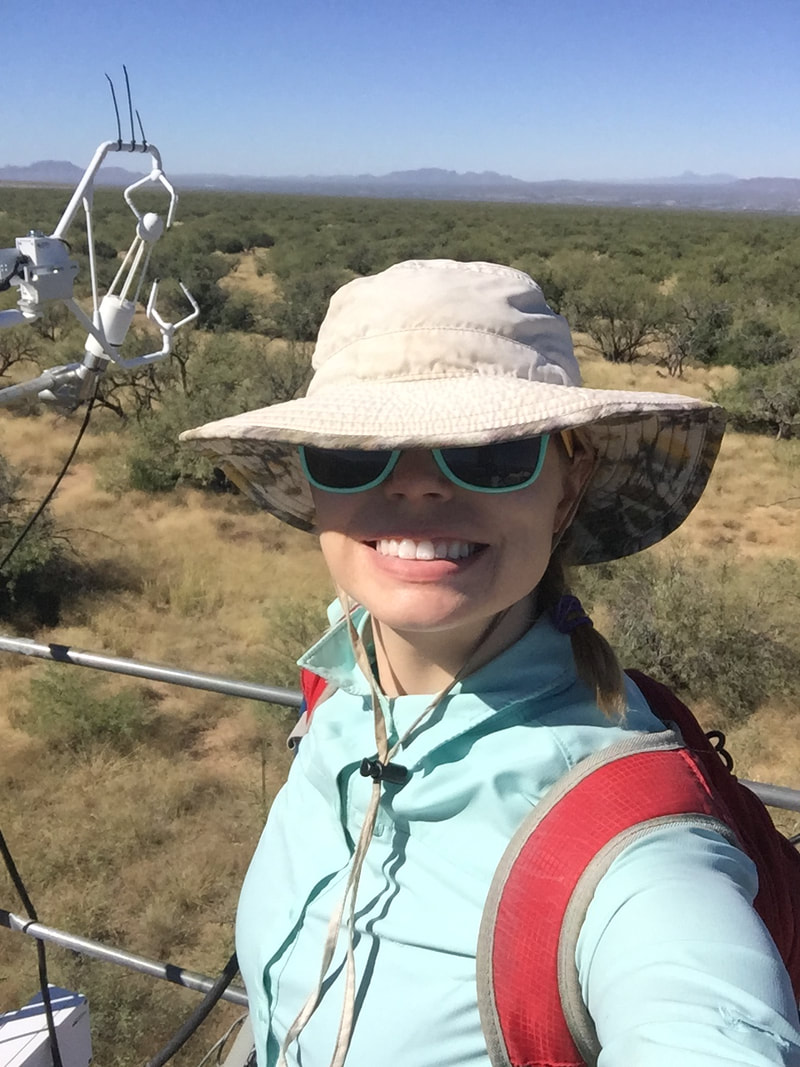Ecohydrology explores interactions between the biosphere and the hydrosphere and associated feedbacks and fluxes, To me, ecohydrology is an exciting and highly interdisciplinary field, where scientists with diverse backgrounds, skills, and research interests can collaborate, interact, and leverage each other’s strengths to move science forward. The variety of thoughtful and multifaceted definitions of ecohydrology provided by others in this series exemplifies the reason I feel at home in this field. Ecohydrology provides both a theoretical framework to integrate my diverse research interests and connections with scientists with different and complementary perspectives.
What are your undergraduate and graduate degrees in?
My undergraduate degree was in Zoology from UW-Madison, where I studied evolution of stickleback fish. My Master’s was in Natural Resource and Environmental Management at the University of Hawaii at Manoa, where I focused on satellite remote sensing of cloud cover and evapotranspiration modeling. My PhD was in Watershed Management and Ecohydrology from the University of Arizona, where I explored dryland carbon uptake across spatial and temporal scales using remote sensing and fluxes.
How did you arrive at working in/thinking about ecohydrology?
My path toward ecohydrology reminds me of the quote from the Dalai Lama: “Remember that sometimes not getting what you want is a wonderful stroke of luck.” I arrived at the University of Hawaii at Manoa with plans to refocus my interest in animals towards applied wildlife research. I even had a project planned to study an elusive and mysterious colony of feral wallabies (yes, wallabies!) on Oʻahu. Alas, the days of funding for descriptive studies of naturalist oddities are over, and I was back at square one. Dr. Tomoaki Miura generously took me under his wing and invited me to be part of a project lead by Dr. Tom Giambelluca to model evapotranspiration over the Hawaiian Islands. Dr. Miura taught me the remote sensing and coding skills that became the foundation for my future research career. I then took a position under Dr. Susan Moran at the USDA Agricultural Research Service, who gave me a giant stack of scientific manuscripts to read on hydrology, dryland ecohydrology, and vegetation ecology when I first arrived to Tucson that provided the background and motivation for much of my dissertation research. My PhD co-advisor Dr. Dave Breshears’ Dryland Ecohydrology class was my first formal study of ecohydrology. At first, I felt overwhelmed by the both the breadth of topics and techniques relevant to this community, and the “messiness”, inherent in such interdisciplinary and complex problems. As I continued through the course however, I realized that such complexities are opportunities to advance our understanding of important questions, and I don’t have to personally know everything, that’s what collaborators are for!
What do you see as an important emerging area of ecohydrology?
Developing new quantitative approaches to extract insights from the deluge of environmental data available from satellites and coordinated sensor networks is what excites me most about ecohydrology now. Due to advances in sensors, networks, and other infrastructure, vast quantities of data on biological, physical, and environmental properties are now accessible on the Internet. Combined with an ethos of open science and data sharing, such advances in data availability have the capacity to transform ecohydrology. In particular, I am interested in assessing the impacts of climate change on ecosystems across spatial and temporal scales by integrating data from heterogenous sources in the context of interdisciplinary research.
Do you have a favorite ecohydrology paper? Describe/explain.
In ecohydrology, soil is the interface between the hydrosphere and the biosphere, and soil moisture is a critical variable that drives key ecological and hydrological processes. Despite thinking a lot about soil and soil moisture, I was unaware of the ubiquitous and diverse communities of living organisms in arid and semi-arid soils until I read Jayne Belnap’s 2003 Paper in Frontiers in Ecology and the Environment. Biological soil crusts are incredibly fragile, invisible to the untrained eye, and are crucial to the health and productivity of desert ecosystems. At the beginning of this paper, I didn’t know what biological soil crusts were, and by the end, I was both fascinated by their multifaced role in ecosystems and wholly convinced they should be of top conservation priority. This paper exemplifies excellent scientific writing – it is clear, concise, holds the reader’s interest throughout, and a delight to read. Also, it turned me into a militant trail stayer-onner - don’t bust the crust!
What do you do for fun (apart from ecohydrology)?
I love to hike, especially with my partner and dog. I am rediscovering my love of water activities after leaving the desert including swimming, canoeing, stand-up paddling, and waterskiing. I love games (board, card, and video) and trivia. I also have been enjoying going to opera, ballet and other musical performances put on by IU’s renowned Jacobs School of Music.

 RSS Feed
RSS Feed